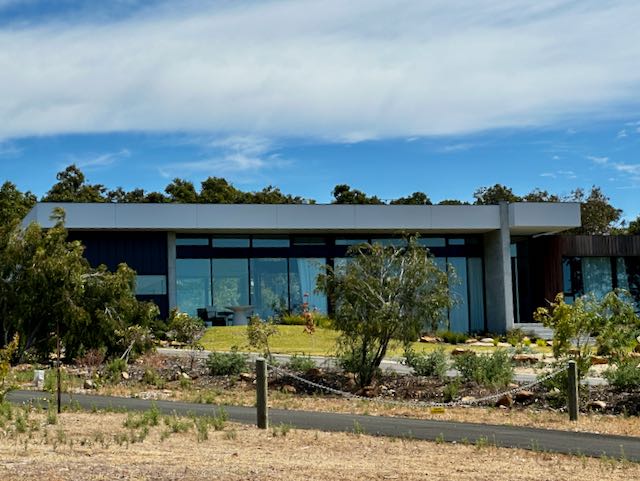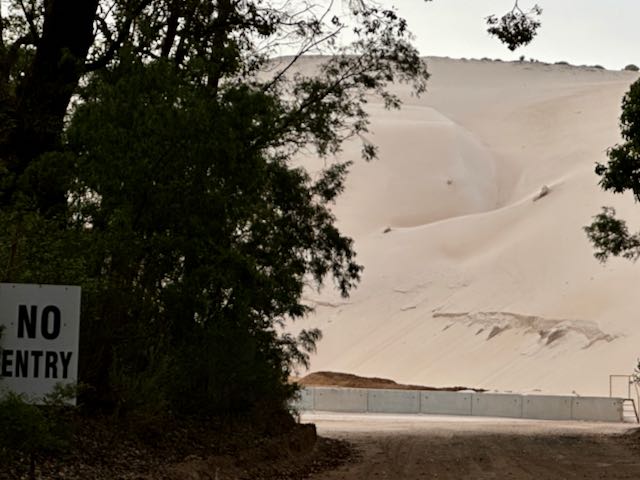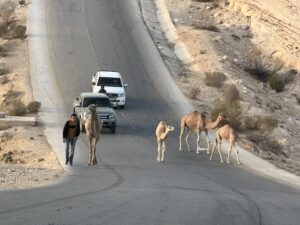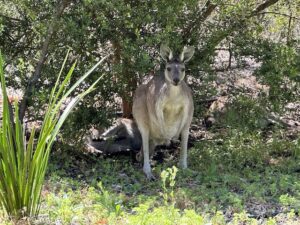I know a few things about Australia. It’s population is about 26 million. Around a third of those live in New South Wales. And a whopping 85 percent live within 50 kilometers (32 miles) of the coast. But did you know Aussie motorcycle gang members are called “bikies” (BYE-keez)? Or that cyclone season – what we call a hurricane – is from November to April? Here are a few more things I learned:
- Western Australia (WA) is rich: This region produces 38 percent of the world’s supply of iron ore, not to mention 17 percent of the world’s gold reserves (60 percent is in WA) and 18 percent of the world’s lithium – the “new gold.” The WA state government actually runs a budget surplus, returning AU$400 to taxpayers in the form of energy credits in 2022. No other state in Australia, as far as I can tell, has a surplus – it’s the richest state.
- People are moving to Western Australia: Next to Queensland, WA is the fastest growing state in Australia. Perth is Australia’s fourth largest city, but also the fastest growing. It’s just a couple hours from Bali, 5.5 hours from Singapore and not horribly far from India, Bangladesh and Nepal, where my Uber drivers were born. I saw a ton of homes under construction in bedroom communities like Yanchep (pop. 11,022) and Dunsborough (pop. 6,413) and the super affluent Eagle Bay (pop. 120).
- The best place to get outdoor gear: For my trip to oblivion, aka the Outback, initial research led me to Kathmandu, but they mostly sell clothes. A store employee then advised me to check out Anaconda, which I would say most closely resembles the USA’s REI. So, I hopped into an Uber to the Perth suburb of Innaloo to buy a cooler, wide-brimmed hat and a personal safety device (PSD, or transponder). But it was Anaconda’s Ethan, an aspiring geologist, who literally sold me on the most important item of all: the fly net. “You NEED this,” he said. “But that’s ridiculous – are you kidding?” I said. It was the best $4 I ever spent. And I can’t tell you how many times I walked by people on trails trying to pull flies out of their ears, eyes, mouth and nose who managed to say, “You are so smart!” As an aside, I asked Ethan if he had ever actually used a PSD. To my surprise he said, “Yes.” While doing a geological survey on motorcycles way, way out in no man’s land, his friend was bitten by an extremely poisoness brown snake. After the PSD was activated, a rescue helicopter arrived to the site within five hours. Without it, he said, his friend would have died. Sold.
- Woolworths lives! To load up my cooler and buy ice, I found the largest supermarket chain in WA: Woolworths. Next are Coles and IGA, FYI. Affectionately or not, lately (due to inflation) called “Woolies,” this supermarket has absolutely nothing to do with the old FW Woolworth (aka *Woolworth’s”) retailer in the United States. That chain closed its last store in 1997, but lives on as Foot Locker, which Woolworth’s started in 1974 as Kinney Shoes. Trivia!
- Illegal drug of choice – meth: If you wonder what some of those nefarious bikie gangs are up to in WA, selling meth is a great place to start. The opioid / heroine / fentanyl craze in the US appears to have bypassed Australia. Interestingly, when New Zealand authorities plucked 3.2 tons of cocaine from the Pacific Ocean (81 bails worth US$315 million on 8 February), the Kiwis immediately said this was bound for Australia, as it was enough to supply New Zealand for 30 years! The cartels apparently routinely drop cocaine into the ocean around here – it floats – where it is picked up later by boat.
- WA can get crazy hot: There’s a reason the campground is empty and restaurant is closed in Karajini National Park in December. It’s really, really hot! The average hi / low is 39 C / 103 F and 23 C / 74 F. So even though it was peak holiday season, most Aussies in WA will stick to the coast or go south of Perth – not north. All I could do in Karajini was swim in the canyon pools, which was still pretty good. Going on a hike would have been a death sentence. When I went to Kalbarri National Park to see Nature’s Window, it was 48 C / 118 F! Anyone walking to the gorge that day would have surely fried. Hell, I barely made it the 500 meters to that tiny hole in the rock. Did I just say, “Hell”? Literally.
- Exmouth is awesome: While most people come to Exmouth (pop. 2,400) to swim with whale sharks (March through August), I was there in late December when it’s nesting season (November through March) for the loggerhead, hawksbill and green turtles. So while I was disappointed – you can still go out and look for whale sharks … they’re just not as easy to find! – watching the turtles come out of the sea in the moonlight to lay their eggs was just as spectacular. Exmouth also was hot – usually around 40 C / 104 F – so I always snorkeled in a long sleeve shirt and hat. But there are also lots of other things to see and do: walk to Yardie Creek Gorge (rock wallabyies and flying foxes!); check out the SS Mildura shipwreck from 1907 or the Vlamingh Head Lighthouse from 1912; or loads of interesting WW2 submarine communications history. The town would not even exist had it not been for WW2, although ultimately it failed as a US submarine port (the subs went back to Fremantle). It’s easily among my Top 10 best places I’ve been on this trip.
- There are no cops in WA: Well, that’s what it seems like. At least compared with Chicago, where every other vehicle is a blue-and-white. In my 8,500 kilometers of driving, I think I passed two patrol cars on the highway and saw maybe another two with their lights on along the side of the road. And do you know why this is? It’s because cameras are everywhere. Especially in the urban areas. In fact, I just got my first speeding ticket (AU$100 / US$67). Somehow the unseen AU authorities mailed the notice to one of my AirBnB Perth residence owners, who then contacted me. The terrifying thing is, I got this ticket within the first five hours of driving! I am bracing for maybe a dozen more. (UPDATE: I just got my second ticket – in nearly the same location on the way back: AU$200 / US$133). My choice is pay online or never visit Australia again. More shades of Big Brother and Chicago, where hundreds traffic light cameras (originally sourced from an Australia-based company that bribed local officials) are used to balance the city budget. Oh yeah, and make the city more safe. Right.
- There’s a lot of secret stuff going on between the US and AU militaries: I could try to tell you about all the satellite and submarine communication surveillance going on south of Exmouth, east of Geraldton and in Pine Gap, outside Alice Springs, but then I would have to kill you. A former journalist I met in Geraldton has a son who works at one of the facilities: “He says if he could tell me all the things the Russians and Chinese are up to, it would blow my mind,” she said. Let’s just say I’m happy that Australia as a nation is a friend, as the free world seems to get a little bit smaller with every passing day.
- Aussies talk funny: One of my favorite things to say to an Aussie is, “Would you mind repeating that – I can’t understand your accent.” Most were taken aback, responding, “It’s YOU who has the accent, mate!” And bloody everyone is your mate. I’m utterly gobsmacked by that. And, for the record, my Aussie name is Steve-O. Book it!
- BONUS: No tipping! If you are 20+ and work in the restaurant industry, the pay is AU$21.38 per hour M-F, $26.73 Saturday, $32.07 Sunday and $48.11 for public holidays. If you are a part time employee with no sick or vacation days, the pay is up to 25 percent higher. Wages decrease incrementally per year until you are 16, where hourly pay starts at AU$10.69 / $13.36 / $16.04 / $24.05, respectively. These are the minimum numbers guaranteed by law. This may add up to a living wage in Australia but it also (based on my experiences) makes for some really slow and spotty service – all too evident in a short-staffed, post-pandemic environment.
- BONUS 2: Say no to plastic! When I asked for plastic picnic cutlery at one of the Australian supermarkets, they replied, “We don’t sell plastic.” Now that doesn’t apply to water bottles and most packaging, but there has been an effort here to ban single-use plastic goods from store shelves, like plastic straws and stirrers, cups, bowls and cutlery. Our grandparents didn’t use plastic, right? And even stubborn, set-in-my-ways Steve has been reprogrammed to carry a reusable cloth bag in my car at all times, so it can be done. You’ve got to start somewhere.







